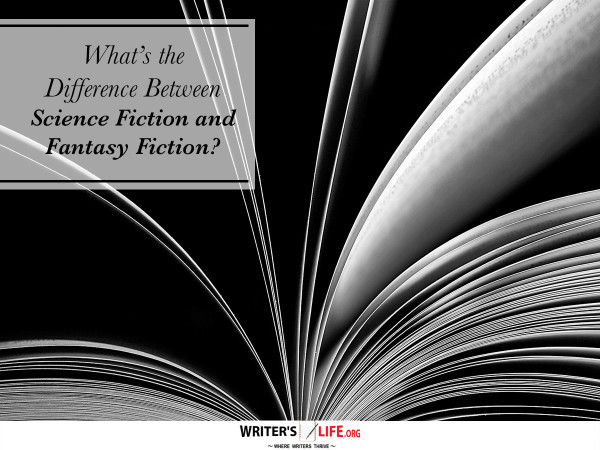- How To Tackle Jealousy In Creative Writing
- Common Submission Mistakes
- How To Stop Your Blog Becoming Boring
- The One Thing Every Successful Writer Has In Common
- How To Make Yourself Aware Of Publishing Scams
- Why Almost ALL Writers Make These Grammar Mistakes At Some Point
- 5 Tips For Authors On How To Deal With Rejection
- Top Mistakes to Avoid When Writing a Novel
- How to Avoid Common New Writer Mistakes
- 10 Mistakes New Fiction Writers Make
What’s the Difference Between Science Fiction and Fantasy Fiction?

Share, Pin Or Retweet If You Love Writing!
In the introduction to an episode of The Twilight Zone, Rod Serling said: “It’s been said that science fiction and fantasy are two different things. Science fiction—the improbable made possible. Fantasy—the impossible made probable.”
In the end I’m happy with whatever definition of SF and/or fantasy you’re willing to provide and am delighted by both genres both in the ways they’re different and the ways they’re the same—and the third thing: the way they interact and comingle with each other. Still, it’s an interesting question and one that is certainly germane to this blog.
You may have noticed that the interviews you occasionally see here always start with the same two questions:
Please define “fantasy” in 25 words or less.
and
Please define “science fiction” in 25 words or less.
I’ve gotten some terrific answers to those questions and at risk of abandoning the basic question in the title of this post I’m happy to agree with each and every definition. But surely I have an opinion on this subject after a lifetime in the SF and fantasy business?
To me, fantasy is fiction that presents elements that are not found in the real world (technology, monsters, superhuman abilities, etc.) and the explanation for those unreal elements is some form of magic. In fantasy, things just happen because in that strange other world or alternate reality things like that (people flying around on brooms, turning into monsters, and conjuring information or energies out of thin air) just work.
Science fiction might do all those same unreal/impossible things but the explanation given is based on some kind of imagined science or technology. How did I turn into a monster? It was a virus that did it, or radiation. How am I able to fly around? It’s a jet pack cobbled together by a genius inventor. That’s science fiction.
Obviously, fantasy authors aren’t requited to show how a particular magic spell, ritual, or item actually works. If the explanation is “it’s magical,” I’m perfectly willing to buy into that, knowing full well it’s entirely invented and no matter how hard I study the text or how many live spiders I swallow I will not actually ever be able to cast a spider climb spell. I know what fantasy is and am not only able to suspend my disbelief and buy into the fiction of wizards and orcs, but excited by the prospect of doing so for however long the book, movie, or game lasts.
If you are self-publishing a science fictiion or fantasy book, then Writer's Life has a webinar that may help you in your endeavours called How to Get Published, Sell Books & Attract Tens of Thousands of Readers by Selling Your Content on Amazon’s Kindle CLICK HERE! This is a webinar that teaches writers how to self publish online, self publish to Amazon's Kindle Direct Publishing Platform and market, promote and sell their written material online.
Science fiction ... puts a slightly greater onus on the author to “get it right,” but then, only slightly. How, exactly, do the flying cars in Blade Runnerwork? I have no idea. And I’m perfectly willing to just think, Wow, those are cool . . . wish I had one, for the duration of the movie. I’ve said many times before that if you actually know how to get a spacecraft to travel faster than the speed of light, please at least delay your science fiction writing career and go be the Bill Gates of the FTL Revolution. For the rest of us, as long as we’re consistently applying a set of invented rules for how people interact with that FTL drive, we’re good to go.
So that being the case, what is the difference between science fiction and fantasy?
They do more or less the same thing: provide a stage for commentary on, as Douglas Adams said, “life, the universe, and everything,” by filtering sometimes very difficult subjects through myth and fable to make a point. In many ways science fiction ends with, “and this could actually come to pass,” whether “this” is a nuclear holocaust (a cautionary tale) or “this” is a galaxy-spanning Federation dedicated to the peaceful exploration of space (an aspirational tale). We didn’t quite get to the moon city and commercial space shuttles of the movie 2001: A Space Odyssey, but aside from the alien monolith what we saw in that movie was, and remains, possible. People have been building amazing gizmos since the Neolithic Period, and like we talked about last week, we’re only getting better and better—or, at least, faster and faster—at doing that so, sure, the future may very well include a moon city, FTL starships, ringworlds, and light sabers. If we could figure out how to fly, communicate over long distances, arrange so that at the age of 50 I still have a full set of teeth, and turn the moon into a place people have been to—all of which would be impossible-to-imagine miracles to someone from the year 1014—what unimaginable miracles does the year 3014 have in store for us?
Fantasy, on the other hand, never pretends that someday you’ll be able to make a pact with demons to become an immortal vampire; that you’ll ever be able to swallow a live spider, wave your hands around, and climb on walls like Spiderman; or teleport from here to there by summoning the mana that surrounds us in all living things.
Now, having said that, someone reading this in the year 3014 will probably say, “Yeah, what? We can do all those things. My sister’s a vampire.” And watching it happen would seem, to me at any rate, like magic. The same way that I know the computer I’m using to write and publish this isn’t at all magical but a device cobbled together by my fellow non-magic-using humans, but I still don’t have a detailed understanding of how it actually works.
Maybe the difference between fantasy and science fiction is that in science fiction we blame other humans for the bad ideas they have and take credit for the good ideas, and in fantasy, good or bad, it’s the gods that did it.
I don’t know.
You tell me.
In 25 words or less.
The Get It Done, Writer's Toolkit. CLICK HERE! is an affordable and useful ebook / audio CD combo set that teaches writers how to overcome writer's block and procrastination. It also provides tips and resources on how to find more time and inspiration to write and helps you apply some of the great advice that great science fiction and fantasy writers has offered other creators in the past.
Philip Athans is the author of this post published with the title Thoughts on the Difference Between Science Fiction And Fantasy at https://fantasyhandbook.wordpress.com/2014/09/23/thoughts-on-the-difference-between-science-fiction-and-fantasy/





























